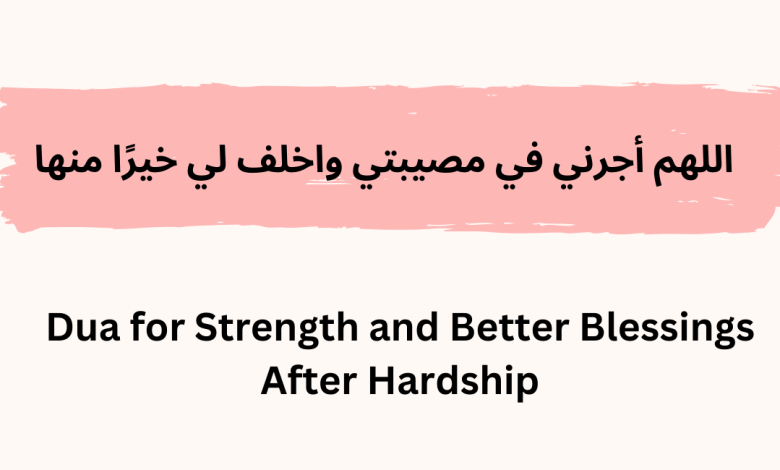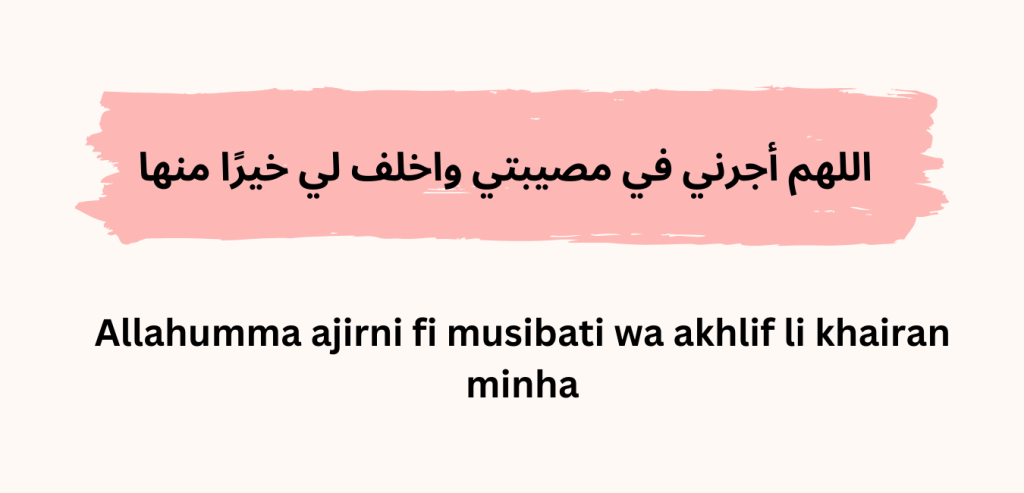Allahumma ajirni fi musibati wa akhlif li khairan minha | Dua for Strength and Better Blessings After Hardship

The du’a “Allahumma ajirni fi musibati wa akhlif li khairan minha” has a deep meaning in Islam. It is a prayer for patience in hardship. The translation is, “O Allah, reward me for my calamity and replace it with something better.” This dua became famous because of a story involving Umm Salama, one of the Prophet Muhammad’s (PBUH) wives.
اللهم أجرني في مصيبتي واخلف لي خيرًا منها
The Story of Umm Salama
Umm Salama was happily married to Abu Salama. They shared a strong bond and deep faith. However, Abu Salama was injured in the Battle of Uhud. He later passed away due to his wounds. His death left Umm Salama heartbroken. She could not imagine life without him.
During this difficult time, the Prophet Muhammad (PBUH) gave her advice. He taught her to recite the dua: “Allahumma ajirni fi musibati wa akhlif li khairan minha.” It was a prayer to ask Allah for strength and for something better in return. Umm Salama trusted the Prophet’s words, though she felt no one could be better than Abu Salama.
Allah’s Response
Umm Salama continued to pray the dua despite her grief. She put her faith in Allah’s plan. To her surprise, Allah answered her prayer in a way she never expected. After some time, the Prophet Muhammad (PBUH) proposed to her. She became one of the Mothers of the Believers. This was a great honor and blessing. Allah had given her something far greater than she imagined.
The Power of the Du’a
This story teaches many lessons. It shows the importance of patience during hardships. It also highlights the power of trusting Allah’s plan. Even when we face great loss, Allah can replace it with something better. Umm Salama’s story is a reminder of Allah’s mercy and wisdom.
How to Use the Du’a
Muslims recite this dua ‘Allahumma ajirni fi musibati wa akhlif li khairan minha’ when faced with calamities. It can be said after the loss of a loved one, during illness, or any form of hardship. The du’a reminds us that everything happens according to Allah’s plan. By saying this prayer, we ask Allah to help us bear our trials and replace them with something better.
The du’a “Allahumma ajirni fi musibati wa akhlif li khairan minha” is a powerful prayer of hope. It teaches us to trust in Allah even in our darkest moments. The story of Umm Salama shows how faith and patience are rewarded. No matter what we lose, Allah can give us something better. We only need to ask and believe.
Meaning of the Du’a

The dua ‘Allahumma ajirni fi musibati wa akhlif li khairan minha’ translates to: “O Allah, reward me in my calamity and replace it with something better.”
Each part of this dua ‘Allahumma ajirni fi musibati wa akhlif li khairan minha’ reflects a profound belief:
- “Ajirni fi musibati”: This means, “Reward me in my calamity.” Here, the believer asks Allah to not only give them patience but also to provide reward for enduring the hardship.
- “Akhlif li khairan minha”: This means, “Replace it with something better.” The believer trusts that Allah can provide a better outcome after any loss.
The Importance of the Du’a
This dua ‘Allahumma ajirni fi musibati wa akhlif li khairan minha’ is not just about seeking relief. It teaches reliance on Allah’s wisdom. Hardships and losses are a part of life, but this dua shifts the focus from despair to hope. It reassures the heart that Allah has a plan, and His plan always brings something good, even after a calamity.
Why We Recite This Du’a
- Comfort during loss: Whether it’s the death of a loved one, financial difficulties, or personal struggles, this dua reminds the believer to turn to Allah for support.
- Trust in Allah’s plan: The believer acknowledges that Allah knows best by asking Allah to replace the calamity with something better.
- Spiritual growth: Hardships are tests that help us grow closer to Allah. Reciting this dua strengthens our faith and reliance on Him. See Also Full Quran Recitation by Mishary Rashid Alafsay



